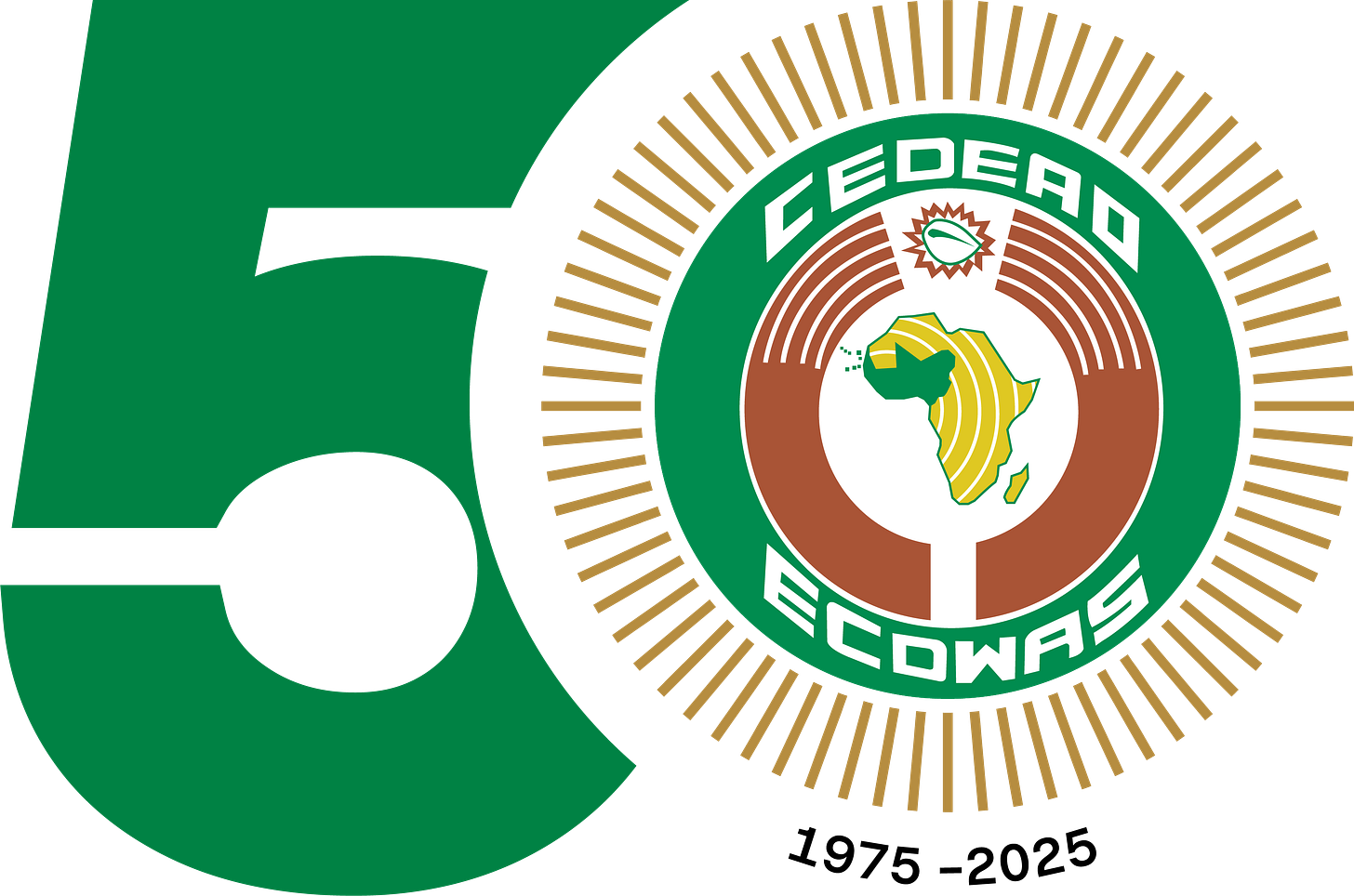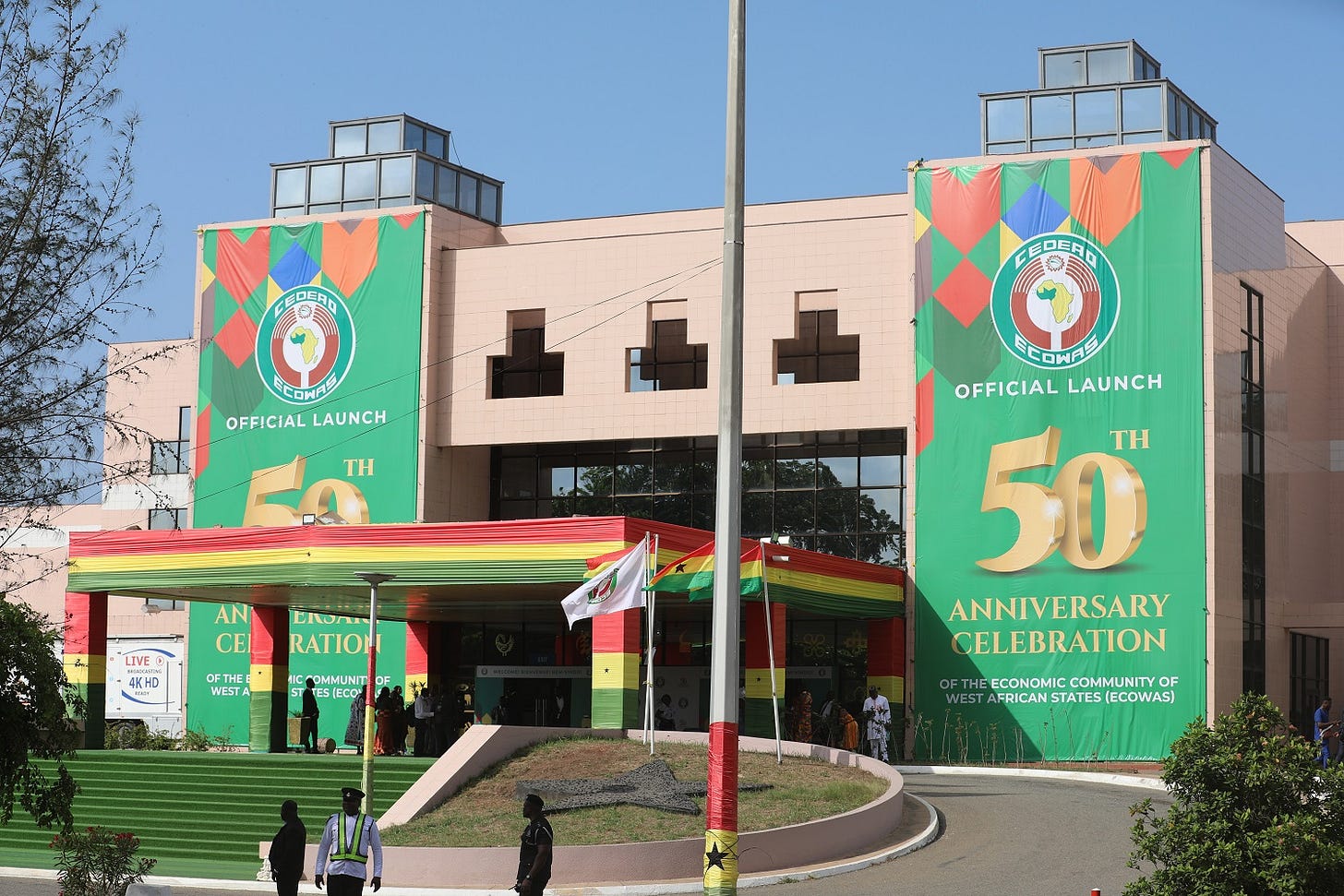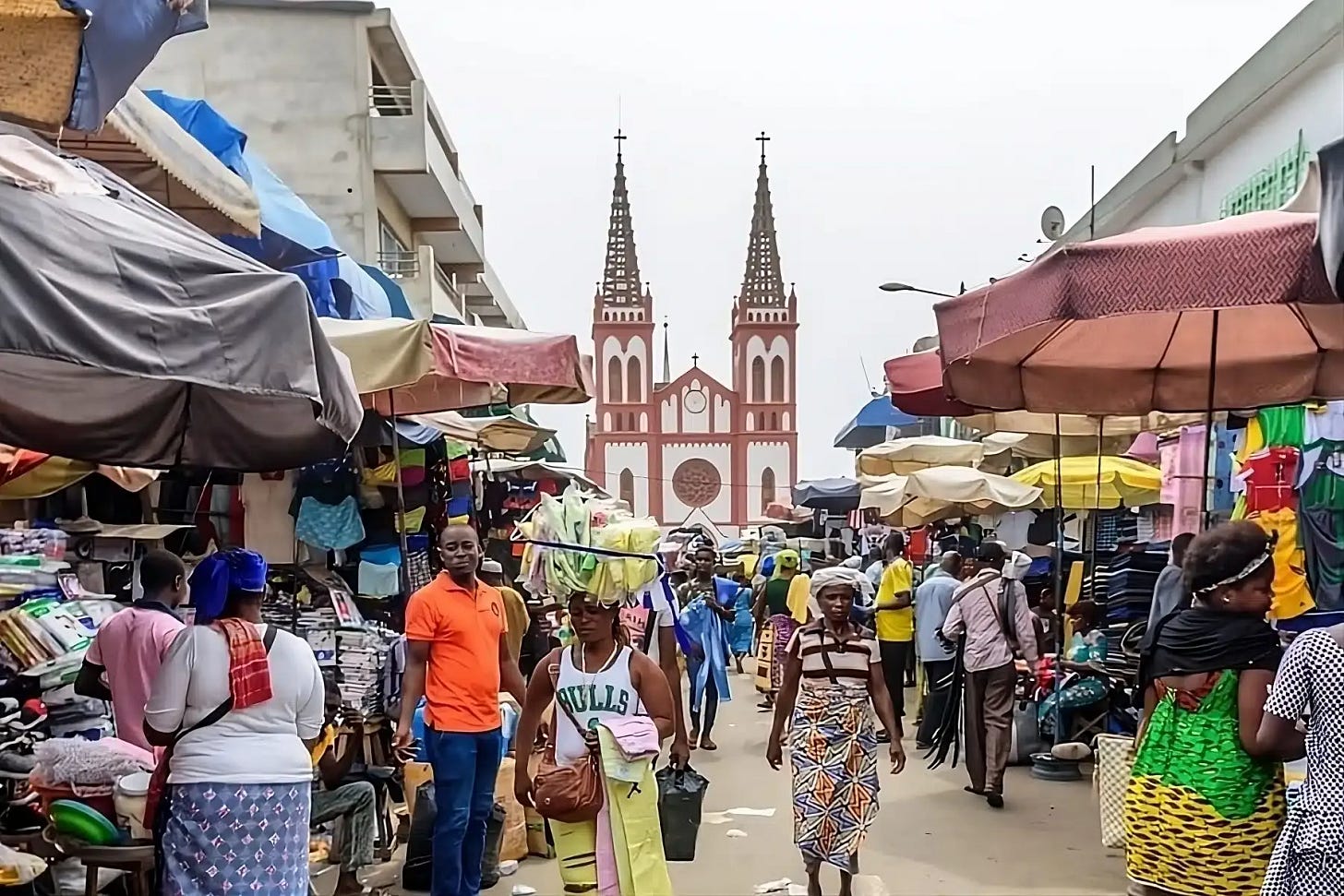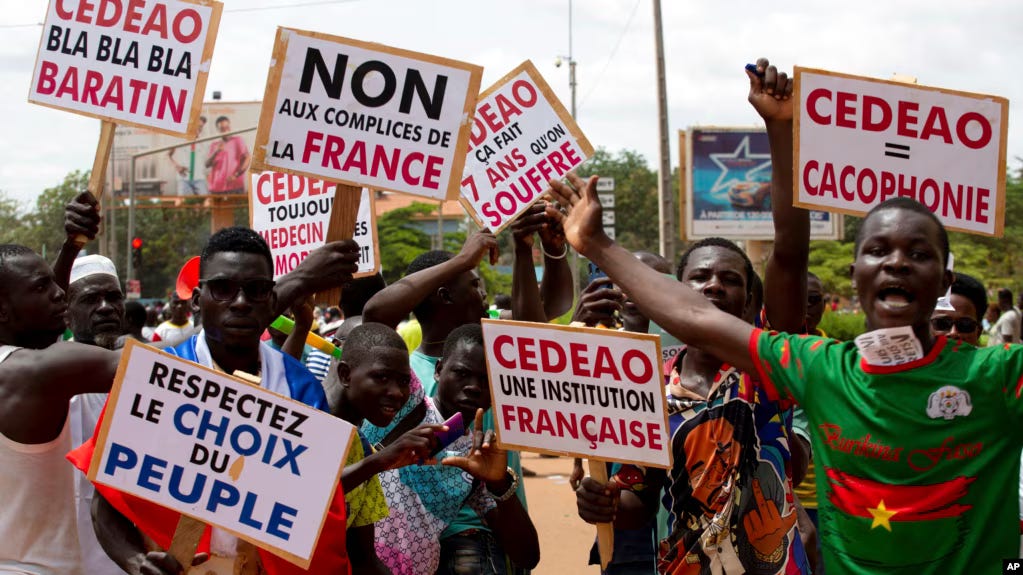ECOWAS @ 50 is a celebration of West Africa's people
As ECOWAS commemorates its golden jubilee, it is far from being the "people-centered" institutions it claims to aspire to be
May 28, 2025 marks the 50th anniversary of the Economic Community of West African States (ECOWAS), which was created to foster the economic and political integration of the West Africa region by creating a common market and implementing protocols enabling the free movement of people and goods.
ECOWAS faces a challenging period that has seen the withdrawal of three of its founding members. But notwithstanding the regional bloc’s unpopularity among many in West Africa, it remains a cornerstone of regional integration and must adapt to contemporary circumstances if it is to remain a relevant geopolitical actor.
Before I go any further, you can enjoy this playlist of 50 songs by West African musicians that I curated. You’re welcome.
West Africa is for the people
Last month, I attended the official launch of ECOWAS’ 50th anniversary commemorations in Accra, Ghana. Bringing together top dignitaries from across the bloc’s member states, the occasion featured several speeches about ECOWAS’ history, trivia and achievements.
As useful as I found the occasion to be, it seemed like a state-centric celebration of governments and the leaders who have headed them. There was a cultural dance performance towards the end of the occasion but overall, I thought that the event did not sufficiently revel in the people without which the fabric of regional integration would not be possible in the first place. To that end, I wanted to center this post around the people of West Africa, beyond the technical jargon, academic debates and political rhetoric that are far too often removed from the nuanced realities in which people in the region find themselves entrenched.
The idea of an integrated, borderless West African region predates contact with Europeans, the trans-Atlantic slave trade, colonization, the dawn of African nation-states and other phenomena associated with modernity. Populations across the vast region have long been mobile and interacted with each other, while people, goods and services flowed freely.
In that sense, the vision of a united West African region that spurred the eventual establishment of ECOWAS in the 1970s was a contemporary expression of an early idea. This concept, based on a rejection of the arbitrary borders created by European colonizers and the promotion of economic, social and cultural cooperation among the region’s populations, is at heart of what ECOWAS was created to do.
Broadly speaking, ECOWAS has lived up to its nomenclature as a community of states, having instituted directives, protocols and a treaty that reflect the predominance of governments. The extent to which the bloc is a community of people is less convincing. Despite the establishment of procotols which legalized the free movement of goods and people across regional borders, the bloc remains a bastion of top-down, elite-driven political organization where community groups, private sector organizations and other civil sector segments are secondary—if not tertiary—components of the community.
ECOWAS’ Vision 2020, which the bloc’s leaders adopted in 2007, called for a replacement of the “ECOWAS of states” with an “ECOWAS of people,” seemingly responding to the familiar critiques of the organization. But nearly two decades since this new vision was laid out, the shift towards a people-centered ECOWAS remains deferred. But notwithstanding those shortcomings, West Africans have gone above and beyond the vagaries of the nation-state to be in community with each other by building commercial, cultural and digital bridges that have proven resilient in the 50 years of ECOWAS’ existence.
ECOWAS has a lot to be proud of …
Over the years, ECOWAS has polarized opinions in West Africa. For some, it is the embodiment of a grand vision laid out by visionaries like Edward Blyden, I.T.A. Wallace-Johnson, Kwame Nkrumah, Sékou Touré and Modibo Keïta. For others, it is little more than an irrelevant organization superintended by corrupt, power-hungry dictators.
Although these are by no means the only perspectives about ECOWAS that exist, they are perhaps its most salient ones. The experience of the past 50 years suggests, however, that while there is more than a smidge of truth to these characterizations, they prevent us from seeing the full picture of an imperfect but deeply significant organization.
ECOWAS is a trailblazing regional institution whose ideas and precepts went far beyond the West Africa region. The debates during the late 1950s and 1960s among West Africa’s newly independent states about continental cooperation in a “postcolonial” world — the competing visions of the so-called Casablanca and Monrovia blocs come to mind here — influenced the founding of the Organization of African Unity in 1963. Considered to be one of the pillar regional blocs of the continent-wide African Economic Community, ECOWAS’ achievements in the areas of free movement of people and regional peacekeeping have made it an important node in the trilateral relationship between Africa’s regional institutions, the African Union and the United Nations.
To improve trade and the flow of goods through the region, ECOWAS has established Joint Border Posts which are specialized land crossings designed to consolidate border control procedures and services in a single location, thereby reducing congestion at borders and easing the flow of people and goods. I recently visited two such border crossings: the Noepe-Akanu post between Togo and Ghana, and Noé-Elubo, which sits on the Ghana-Côte d'Ivoire border. Although the two facilities are not yet fully functional, their operationalization indicates some progress made in terms of easing the flow of people and goods across the region, particularly in a region where the bulk of trade and employment is classified as “informal.”
The free mobility of people across the region is ECOWAS’ greatest accomplishment. The bloc’s 1979 Protocol on Free Movement, the cornerstone of the bloc’s integrationist framework, is widely recognized as creating the best example of a visa-free regime in Africa. When I think about the many ways my life has been impacted by the mobility of people, goods and services across the region, it accentuates my understanding of politics as a framework within which flawed individuals and institutions can nonetheless make optimal decisions.
To cite some examples, Rose, the first person who ever taught me French, was Beninese. Roger, one of my best friends from childhood, was from Liberia. My preferred bank and airline to use on the continent are Ecobank and Asky Airlines, two organizations headquartered in Lomé, Togo. The best Mathematics teachers I ever had in my lifetime were Ghanaian. Lagos, Nigeria is where I consider to be my “home base” in West Africa, but I feel the same way about Dakar, Senegal where I spend a considerable amount of time and which has become a second home in the region. Abidjan, Côte d'Ivoire might as well be a third, as it is my favorite African city and the one to which I feel most spiritually connected.
Kora and balafon music by artists from Burkina Faso, Mali and Guinea have been a staple right from childhood, and some of my prized ornaments in my home surroundings are a set of decorations purchased in Guinea-Bissau from a trader who is Gambian.
It is possible that some or all of these experiences would have materialized without ECOWAS’ free movement protocols, but that is an unfalsifiable hypothesis. What I can say is that these experiences happened after ECOWAS took steps to make it easier for people to travel, trade and work across West Africa.
… but its failures are real and should be reckoned with.
By and large, ECOWAS has fallen short of its biggest goals. West Africa’s share of intra-regional trade, at less than 15%, has not changed much in two decades even as its overall trade patterns have shifted. The region lacks any significant transport axis connecting the entire ECOWAS zone, with the Abidjan-Lagos corridor highway — an ambitious coastal motorway which will link major cities in five countries — likely to be several years away from completion.
The divide between the so-called Anglophone and Francophone members persists despite efforts to bridge it, to the extent that the two blocs have separate economic and monetary unions that reflect their colonial heritage. Like virtually every other African multilateral institution, ECOWAS depends on foreign donors to fulfill many of its functions.
The ECOWAS National Biometric Identity Card (ENBIC), which the bloc adopted in 2014 as a multipurpose identification card that West Africans citizens can use within the region, has not been fully adopted across the board. The cost of acquiring identification documents like passports, resident cards and the ECOWAS travel certificate is far too prohibitive for the average West African citizen, who likely does not own any of them. Travel and mobility protocols are enforced unevenly across the region, and the lack of harmonization often has negative consequences for travelers from other West African countries.
The ecstasy of ECOWAS’ protocols on free movement of people and goods is blotted by the history of economic nationalism, nativism and other forms of exclusionary policy in West Africa, like Nigeria’s 1983 Aliens Expulsion Order and 2019 border closure, the concept of ivoirité in 1990s and 2000s Côte d'Ivoire and Ghana’s aggressive enforcement of Investment Promotion Council regulations that contravene the letter and spirit of the bloc’s free movement protocols.
Nigeria’s effort to spearhead a digital registration system for driver’s license and vehicles in partnership with ECOWAS and the West African Road Safety Organization is moving at snail’s pace. I could write an entire book about my stressful experiences dealing with West African border officials, or trying to settle payments in a region where there is no common currency, digital payment systems are scarce and cash remains king.
It is in the realm of peace, security and governance, however, where ECOWAS’ failures have been most pronounced. In contrast to its relative success in responding to peacekeeping crises across the region, ECOWAS failed to respond effectively to the rise of violent extremism in West Africa that has transformed the region’s geopolitical order.
Despite incremental reforms implemented in the 1990s and 2000s that were ostensibly intended to shore up ECOWAS’ credibility as a guarantor of stability in the West Africa region, the bloc has struggled to bear the responsibilities that came with its expanded mandate.
On issues of democracy and governance, it has contributed to backsliding in the region by endorsing the outcomes of sham elections, turning a blind eye to corruption, human rights abuses and other forms of repression by governments and prioritizing the prerogatives of West African heads of state and Western powers over the region’s citizens.
These deficiencies go a long way in explaining ECOWAS’ unpopularity and lack of credibility among many West African citizens, including in Burkina Faso, Mali and Niger where the ruling juntas there withdrew from the bloc and have formed their own association called the Alliance of Sahel States (AES).
For many West Africans, military juntas are no worse than civilian dictatorships and it is time for ECOWAS and its partners to engage their perspective rather than lecture them about the virtues of a “democracy” they have rarely ever experienced and evidently have no faith in.
Which way, ECOWAS?
A popular argument is that ECOWAS suffers from a perception problem. It is common to detect versions of it in scholarly and media discourses, and I have heard it countless times from ECOWAS officials. Per this reasoning, the bloc does not do enough to communicate its virtues to skeptical citizens across the region and could use a revamped image as part of restoring its credibility. Essentially, ECOWAS can and should explain and communicate its way out of its credibility deficiency.
If ECOWAS has an image problem, it is because it has a policy problem first and foremost. The bloc’s political leaders and senior officials bask in the glory of past events and tend to ascribe many “successes” that should go the region’s citizens to an ECOWAS that many West Africans do not view as congruent with their aspirations.
The establishment of the AES is viewed by many as the biggest threat to ECOWAS’ corporate existence. This might be a false binary, not least because the two blocs are not quite the “rivals” that they are assumed to be. Burkina Faso, Mali and Niger are surrounded by ECOWAS members with which they have a mutually dependent relationship.
There is a tendency to overstate the impact of decisions made by formal institutions that have a tenuous relationship with African societies. The citizens of the two blocs, who share family, cultural and economic ties, will always desire to be integrated, and so should their political leaders. In any case, it is possible—perhaps even welcome—to have more than one multilateral institution in a region as seen in other parts of the world.
If ECOWAS is to survive for another 50 years and be a relevant actor in the West Africa region, then it must be the “ECOWAS of people” that the region’s leaders have said that they want it to be. Heavyweights like Nigeria, Ghana and Côte d'Ivoire must continue to bear the leadership role that they have historically claimed as theirs, particularly as regards the political and economic integration for which the bloc was established.
ECOWAS does not have a divine right to exist. If West Africans believe that the bloc is no longer useful or relevant to their lives, they will invariably turn to alternatives. It falls on the region’s leaders to provide a vision for ECOWAS’ continued existence.










Well written and insightful essay!!! In my personal opinion, an important thing to consider here is how full regulatory and legal harmonization, the prohibition of local protectionism, and the allowance of unlimited capital flows, pushed on us by our centralized information ecosystems as tools of integration, can lead to underdevelopment and ironically far less integration and eventually even disintegration. When every region and big-locality is denied the right to tailor rules to its own evolving institutional, scientific, industrial, and cultural capacities, it is effectively denied the ability to incubate its own ecosystems of productive capacity, financial intermediation, and knowledge expansion; and its also denied the ability to fully access its community's talents and creativities. Integration that suppresses regional differentiation leads to “passive” economic landscapes, where only the already-capable centers (usually ex-colonial capitals or financial enclaves) accumulate the power, people, and productive infrastructure needed to form meaningful internal and external linkages. This doesnt just diminish regional initiative, it hollows out the very ability of a people centered polity to emerge in the first place
The USA, during its most democratic and participatory eras, roughly from the 1830s through the late 1960s, avoided these pathologies by following an entirely different architecture than what it has today. Through internal capital flow inhibitors, regionally varied banking laws, fragmented regulatory regimes, and selective tariffs, it allowed regions to mature on their own terms. Small cities could a limited but still substantial share of their area capital and direct it, train labor, and generate local industrial, commercial, scientific, and cultural ecosystems without being cannibalized by far away power centers. From these structures emerged a multiplicity of political and economic centers, which in turn created dense networks of institutions, civic life, and interregional cooperation.
This decentralized but deeply integrated system facilitated more durable linkages, between people, firms, and governments, than any imposed harmonization ever could. In my personal opinion, if communities in the USA, or Africa, or anywhere else, want to truly have governance architectures "of the people", they consider resisting the pull of technocratic uniformity and instead empower its regions to develop the capacities needed to be equal participants in integration while still maintaining an integrating system super architecture
ECOWAS must adapt to fast-changing realities.